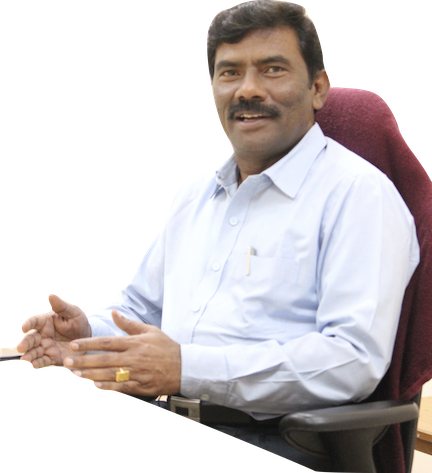Prof. B. Redya Naik, Officer on Special Duty to the Vice Chancellor, opens up on the most ambitious academic reform in recent times — the Continuous and Comprehensive Evaluation system.
Interview by K. Malyavika Gayathri

What is the context for the implementation of CCE?
Today, academic landscape has changed across the world. But most of the students are getting carried away with the social media, etc. and most of their valuable time is consumed in that. They should be more productively engaged in the classroom. For that, we have created some incentives for them to be in the classroom and interact with the teachers. Students need to be more engaged in classwork. That’s the basic idea of CCE. That is why CCE is the need of the hour.
Was there any particular reason or trigger for introducing the CCE?
Recently I had been to USA and I got an opportunity to interact with students in different universities there. I found that they are earning while learning and they’re spending their time very judiciously. I thought why is it not possible in our country also. Why can’t our students also earn while learning? This is the reason why we have first reduced the total credits to bring them on par with the national norm of 80 credits. Earlier, we used to have 96 credits and it was thoroughly packed throughout the week so that there was no breathing space for students.
And the second thing is that acquiring knowledge was different a decade ago compared to today. Earlier, the source of information was only the book or the teacher. But today the source of information is multi-faceted – the information is available at the fingertips so you need not waste time searching for it. Information is readily available, but the thing is that you need to synthesise, create content and make some sensible output out of that knowledge. So, that is the core idea behind the implementation of the CCE.
But many students are unable to balance academics because they are working.
The point here is that we made the attendance mandatory. But you can spend time…On Saturdays there’s no classwork. Sundays there is no classwork and on other days, you have only morning hours. Afternoons you are free. In case classes and internships overlap, what you can do is that you discuss with the head of the department and see that the time table can be set so that three days comprehensive classwork and remaining three days you can spend at internships etc., which is also part of your study. That is possible.
Were there any challenges while proposing the idea in Osmania?
Challenges, yes. Technical awareness is the biggest challenge. Most of the faculty members are not really well-versed with these kinds of work. Now, everything is online. All they have to do is they have to upload the marks. Just uploading the marks is also a difficulty for some of them. In spite of that, we are driving it and I’m sure that by the end of second internals, everything will be alright. Once it is on track I think it will go ahead with full speed. So, initial hiccups were there but we are working on them.
The second internals were conducted in such a short time. There was so little gap that we didn’t even get to complete the syllabus properly.
You have a point. Actually, your first internals were scheduled way before elections were announced. They had to be postponed because of the election schedule. This second internals cannot be rescheduled again. If it is rescheduled everything will be compounding and will be extending the stipulated period of semester.
Is the faculty trained and prepared for CCE? Will it be extended to UG courses?
Yeah, we have conducted workshops. We are repeatedly going on sensitising them, motivating them, advocating them, whenever there is a possibility. That process is ongoing.
As for UG, right now, all the PG programmes that do admissions through CPGET are under the implementation of the CCE. We have not touched Under Graduate courses now. We tried to start with PG programmes which have fewer courses and colleges. And, hopefully, next year onwards, it may also be applicable to the Under-Graduates. Once these two semesters passes through clearly, then we’ll also go to the UG programmes.
Given that most of the University students prepare for various competitive recruitment examinations, how would CCE help them?
Actually CCE is going be very much helpful for the students preparing for competitive examinations. Most of the time, they are going for additional coaching, right? What for are they going to coaching centres?
Because in coaching centres the mode of teaching is different. They teach objective type of teaching – how is the question, what pattern of questions is possible, how this content is being asked in a question – this is how they teach.
Now look at CCE. It is also taking us in that direction. In the first internal assessment, only multiple-choice questions are asked. In the second internals, short answer questions, where we are giving more focus on the objective-oriented learning so that students need not to go to coaching centres.
* * *